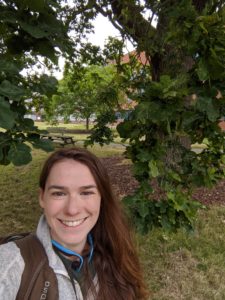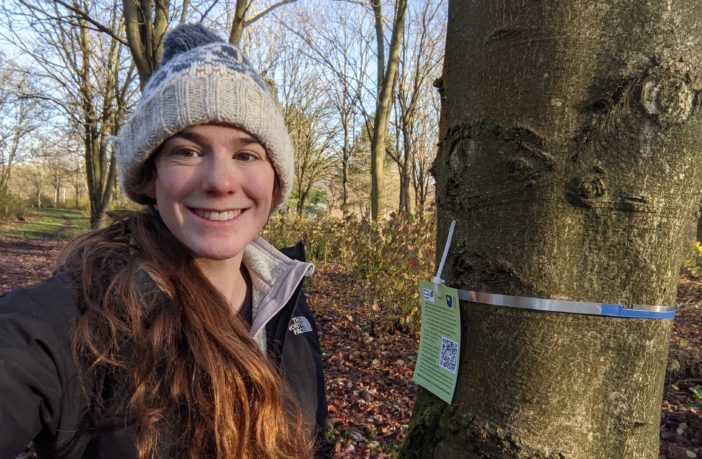“For trees to look after humans, we first need to look after them,” says Kate Hand, an Open University PhD student whose research examines the huge part urban trees can play in the fight against climate change.
Kate, 32, from Aberdeenshire and now living in Milton Keynes, has always loved exploring the great outdoors. Yet it wasn’t until she began researching urban woodlands during her Master’s that she realised just how much spending time in nature boosted her mood and well-being.
“Day after day, I noticed how much more I enjoyed my time wandering through a woodland,” Kate explains. “If having access to greenspace was having this much impact on me on a short fieldtrip, how much must it affect us over lifetimes spent living in towns and cities? I wanted to find out.”
Why we need urban trees
Kate’s research explores how urban trees grow and the many benefits they can provide – a subject area that’s still relatively unexplored:
“Urban trees do lots of good things for us, like removing pollution from the air, climate change mitigation and improving our mental and physical well-being. However, you might be surprised to know that often we don’t know a lot about how many urban trees we have, how big they are or what species they are.
“If we knew this, we’d be able to better manage these urban trees. This would mean we could plan more sustainable urban forests, but also forests which provide us, the majority of people living in urban areas, with the most benefit.
“Like climate change, urban forestry is a slow-changing system. Trees take decades to grow and become mature. There’s the famous saying that the best time to plant a tree is 20 years ago, the second-best time is today.”
Through her research, Kate is encouraging the public to get outside and help collect much-needed data. She is leading the MK Tree Growth Project, a first of its kind study in the UK where members of the public can help track tree growth across Milton Keynes. “Citizen science could help us collect far more data on urban trees than we could otherwise, while engaging people with local nature and science,” says Kate.
Life as an OU PhD student

Kate at the OU Milton Keynes campus
When it came to choosing where to carry out her innovative research, Kate admits The Open University surprised her:
“I didn’t know you could do a PhD at the OU until I saw this PhD project advertised. I was a little unsure what a PhD at the OU would be like – is there a campus? Is it all distance learning? But after speaking to my supervisor, visiting the campus and meeting the school, I knew it was the place for me.”
“The staff and students I met were all so welcoming and there was just a fantastic supportive and inquisitive research atmosphere I hadn’t encountered at other universities.
“I’ve really enjoyed my PhD so far at the OU. The support from my supervisors and my school has been outstanding, particularly through the tumultuous past couple of years.
“There’s such a friendly and supportive atmosphere from everyone which makes it a really enjoyable place to study. The longer I’ve been here, the more I’ve come across fascinating and inspiring things coming out of each corner of the University. Be it researchers leading at the edges of scientific discovery or trialling innovate ways for remote teaching and science communication.”
How can trees tackle the climate emergency?
Kate shares two ways urban trees can help in the fight against climate change and why we need to protect them for future generations:
1) Living carbon stores
“Trees take carbon dioxide out of the air and store carbon in their trunks, branches and roots. Planting more urban trees is important to help increase this carbon pool, but what shouldn’t be overlooked is the importance of retaining existing trees so they can store carbon for longer.”
2) Cooling our cities
“Trees can also help us adapt our urban areas to rising temperatures. They can help to noticeably cool our towns and cities, making them more comfortable for us, and reducing the need for air conditioning. Supporting larger trees in urban areas can help to both store more carbon, as well as providing the greatest cooling benefit.
“Climate change is an issue that will affect every one of us some way or another. COP26 is where the world’s leaders will hopefully agree to some major actions, but communities can also lead the way as well. Communities are stepping up to start initiating that change now, working together to plan their urban forests for the future, undertaking surveys, planting and managing new trees to help mitigate climate change as well as improve the forests’ resilience to the effects of climate change.”
LEARN MORE
- Every year we help thousands of students like Kate achieve amazing things. Join them and learn more about the OU’s postgraduate programmes
- The OU will co-host a unique event at the 26th United Nations Climate Change Conference (COP26) on 7 November, featuring indigenous artists and experts. Learn more about the Green Zone event and how you can watch virtually
- Read more about the MK Tree Growth Project and how you can get involved
- Finally, watch Kate speak more about her fascinating research in the below video produced by OU student Stacy Phillips:



